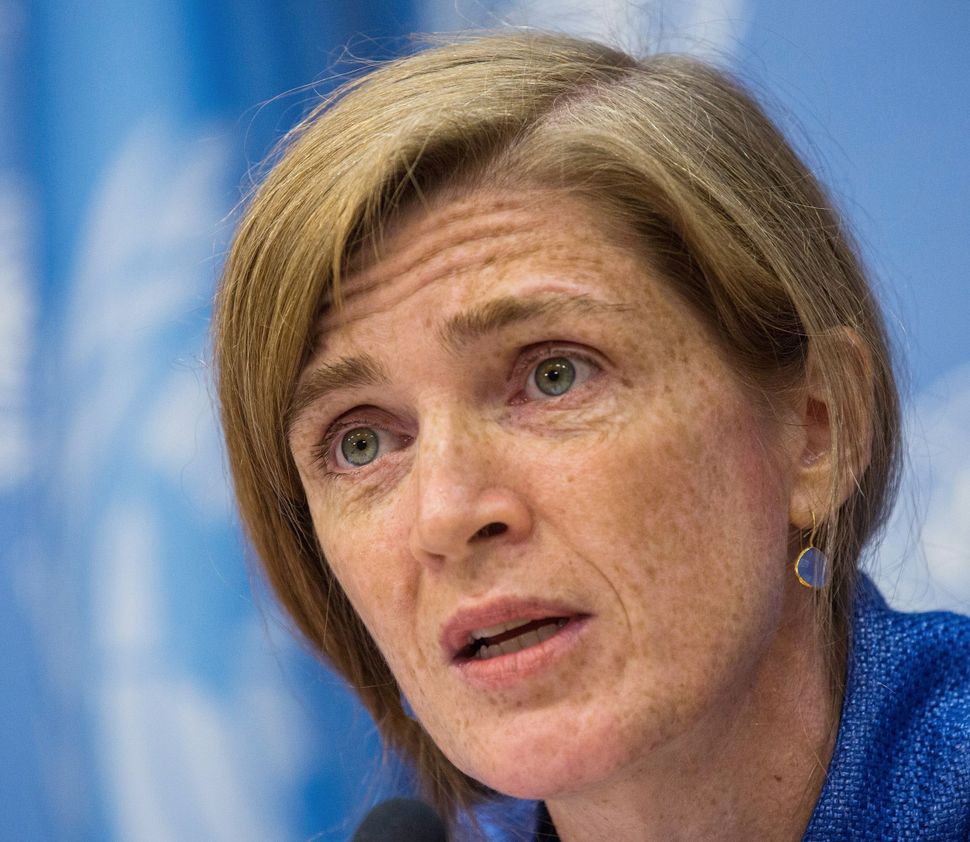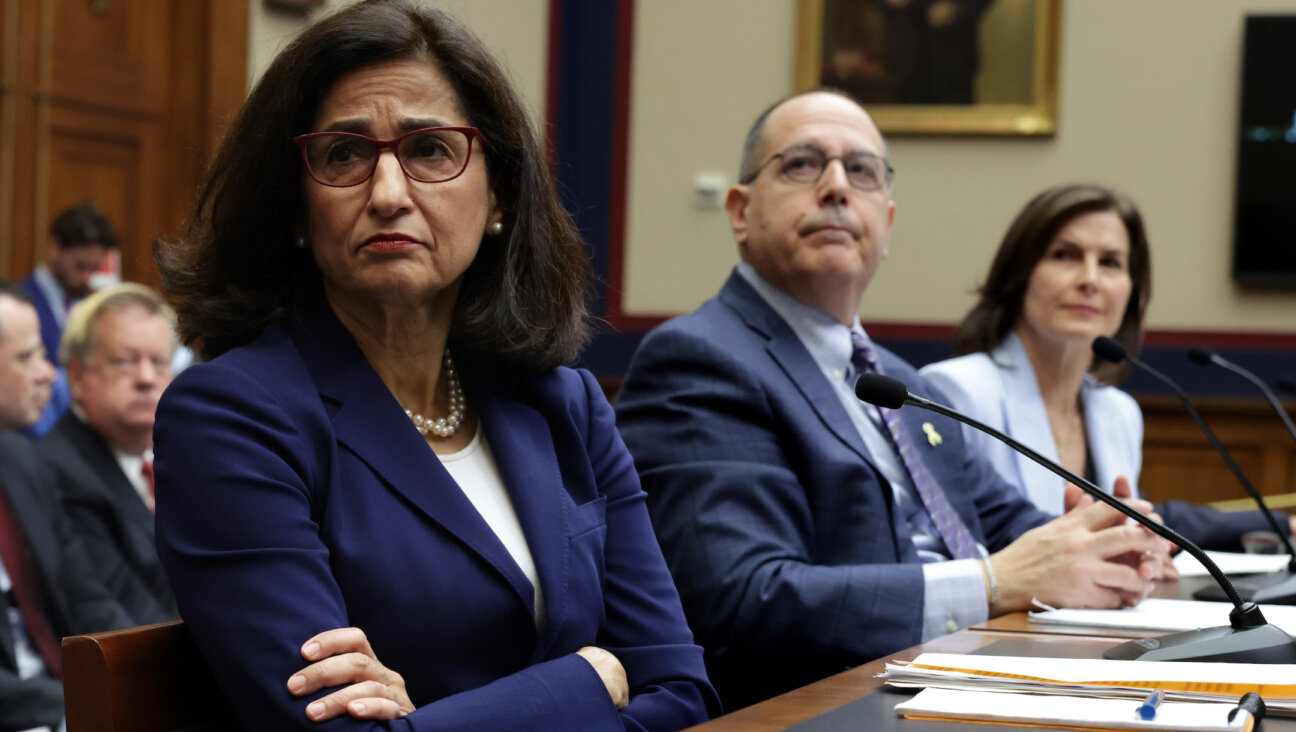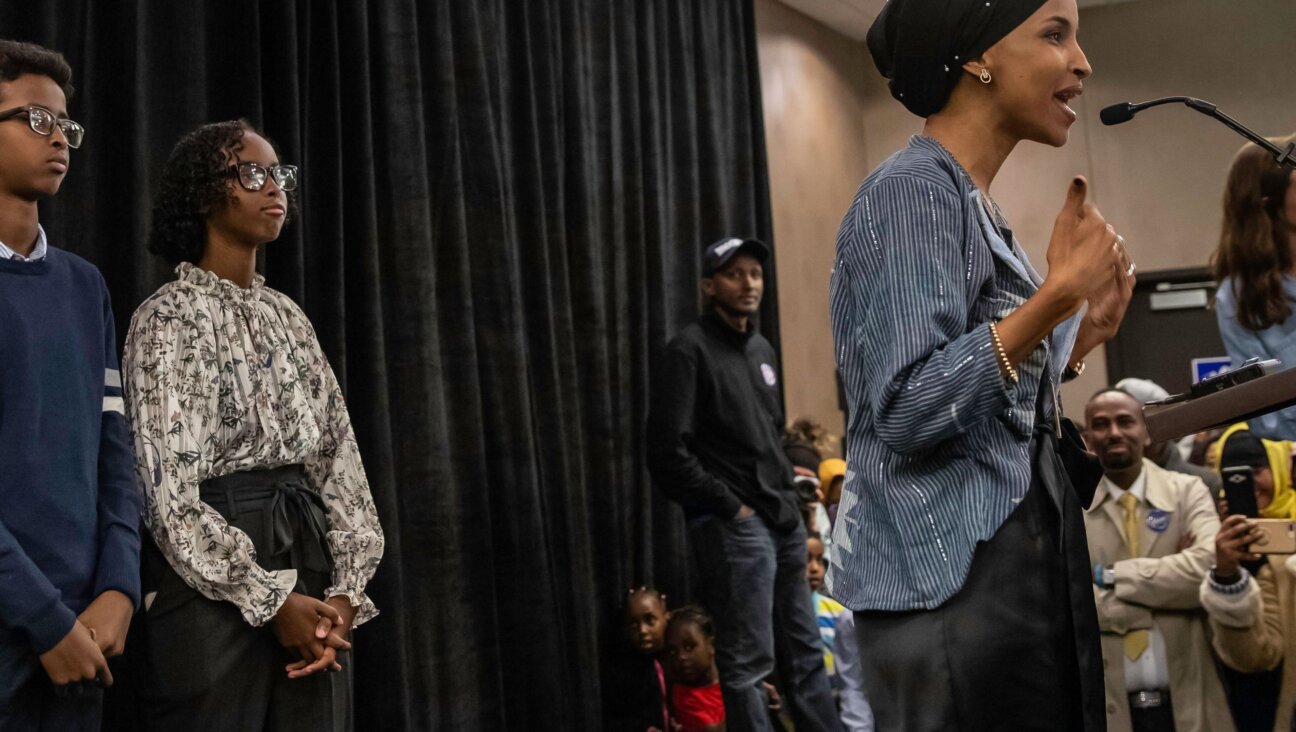EXCLUSIVE: Samantha Power On Her Special Friendship With Elie Wiesel

Samantha Power Image by Getty Images
A Pulitzer Prize-winning author and academic turned diplomat, Samantha Power is best known for her efforts to bring her work highlighting genocide prevention onto the national and global stage.
Power is now writing about her experiences from a perch at Harvard University, after concluding in January a tumultuous four years as the United States ambassador to the United Nations. Active in Barack Obama’s first presidential campaign, she served on the 2008 transition team and then as senior director of multilateral affairs and human rights for the National Security Council before representing the Obama administration in Turtle Bay.
A native of Ireland, Power, 46, grew close to the late Elie Wiesel through their common interest in genocide prevention; she wrote the new introduction to Wiesel’s “Night,” which we excerpted on our site.She spoke to the Forward’s editor-in-chief, Jane Eisner, from Cambridge, Massachusetts, about her friendship with Wiesel, why he’d be on a plane to Juba if he were still alive, and why Twitter is sometimes bad for her health.
(This interview has been edited for space and clarity.)
Jane Eisner: The first official dinner you hosted in your home after you became U.S. ambassador to the United Nations was in honor of Elie Wiesel. Why did you choose to honor him then?
Samantha Power: What anyone who works in government and at the U.N. experiences very quickly is how abstract the suffering of others can be when you are talking about it in a windowless room, when you are debating thousands of miles away from the people who are affected by your decisions. And for me, and tens of millions of people, Elie always found a way to get real. He always found a way to cut through jargon or make you feel embarrassed by your own abstractions.
There’s no thinker or writer or person who has had more influence on my moral understanding than Elie Wiesel, and I found myself and my family suddenly resident at the Waldorf Astoria, [the official residence of the U.N. ambassador], and I thought what a wonderful opportunity to pay tribute to a giant.
Tell us about your relationship. When did you go from being professionals with a shared interest in preventing genocide to establishing a friendship?
I first got introduced to Elie and his life as a kid, like so many millions of children do, reading his story. An Irish immigrant, I read “Night” for the first time in high school in Atlanta, Georgia. I never dreamed that I would ever meet the man, never mind develop a friendship with him. I consider it the blessing of a lifetime that our relationship developed over time.
I wrote “A Problem From Hell,” my book on American responses to genocide, and after I finished it, I sought him out. He was someone who kept popping up in its pages as an advocate when it mattered most. As I looked into Cambodia, Saddam Hussein, Bosnia, Bitburg, there was Elie Wiesel. Again and again he made himself a historic voice, and an extremely relevant voice, when issues of great moral magnitude were hanging in the balance.
So I sought him out, and he was kind enough not to hate the book I had written! There is no greater terror than sending off your battered manuscript, six years of work, to someone who appears repeatedly in the book, and also to someone who has been such a foundational inspiration for the sensibility that gave rise to the question at its heart: Why are we bystanders in the face of genocide? In the wake of this first meeting, we began a correspondence.
Soon thereafter, the genocide in Darfur, Sudan, occurred. And Elie, to his eternal credit and in keeping with how he had lived his life for decades, made himself a public voice for action to try to help those people who were being slaughtered in Darfur. We worked together to press the U.N. Security Council to do more, and we spoke at rallies in Washington and at advocacy events in New York.
That period was quite gratifying for him — not because there was any silver bullet to Darfur but because what he saw across the U.S. was a burst of activism by young people on college campuses who demanded that the principle of “Never again” be brought to life.
In your foreword to the new edition of “Night,” you talk about being haunted by Moishe the Beadle, an odd character from Wiesel’s town who tries to warn people about the Nazis, to no avail. Is there a Moishe the Beadle on the world stage today, who is trying to warn us of an impending tragedy?
We all have these moments where injustice is brought to us. It can be ordinary injustice, or it can be injustice on an epic scale, like Moishe the Beadle tried to convey. It’s tempting not to believe, or to believe and not to fully process, to keep horrible or inconvenient information at remove.
I think of “Caesar,” the code name of the Syrian photographer who smuggled out thousands of graphic photos [taken from 2011 to 2013] of Syrian prisoners who had been systematically tortured by the Assad regime. Some people didn’t believe him; others believed, but pushed the information away. Amid the challenges associated with whether and how to intervene in Syria, we, the United States, and the world didn’t find a way to respond to those crimes in a way that Caesar would have imagined when he risked his life to bring us this damning evidence.
That’s a very vivid, single individual who did his part as much as the Beadle did to get the world to see, to shake the world. I know how devastated he is, not only by what he saw, but also by the fact that we and other government officials who saw the photos didn’t do far more in response.
You wrote that Wiesel would venture to unlikely, isolated places — to meet with refugees escaping the Khmer Rouge and Miskito Indians driven from their land in Nicaragua. If he were alive today, where would he go?
While the Holocaust was the defining event of his remarkable life, he didn’t believe that something had to be genocide, or even a mass atrocity, to be worthy of his activism, of his voice. He was aware of the power of his voice, and the importance of preserving its heft, weight, so he didn’t throw his moral authority around on issues without deep reflection on the good that could be done if he lent support to a cause.
Sometimes as we seek to apply “Never again,” as we resolve not to be bystanders, we can miss injustices right before our nose. Elie taught us not to do that. The bar need not be set as genocide for when we act. If it is, we may miss the opportunity to do something within our communities in our time, or we may miss the opportunity to act abroad before it is too late.
It is perilous to speculate on what Elie might be doing or where he might be traveling today. But I suppose I can speak to issues that cry out for attention. I know that Elie cared about the ghastly plight of refugees, as right now more people are displaced from their homes, 67 million, than at any time since World War II. In his life he often showed solidarity with those individuals, and, despite all the fear that people have about bringing refugees in — and we have to address people’s fears and not just blow past them — he served as a remarkable example of what a refugee who comes and is embraced by the United States can give back. Throughout his life, through his travels, he gave faces to refugee crises, and managed to break down this abstract idea of a “refugee” into discrete families who are just trying to keep their children fed, safe, alive.
Elie often would go to places where the news wasn’t. Yemen today is a place where the suffering is so acute, and where there is an alarmingly large gap between the scale of the disaster and the amount of outside coverage, interest and response.
And South Sudan — Elie was so heartened when that people who suffered a genocide achieved independence from their tormentors. And now their alleged leaders have driven their country to ruin. I imagine he would be on a plane to Juba right now.
In a 2014 New Yorker profile, you said: “My career is not well thought-out. Every choice has been instinctive, and quite literally, impulsive, in many ways.” Is that still the case? How would you describe your career now?
I got to know Elie’s son when I was a freshman counselor at Yale and he was a freshman. I loved seeing the way Elie related to his boy and later to his grandkids. He gave off the feeling with them as though time was standing still.
I had both my kids while working in the White House. They are now 8 and 5. They grew up with a mother who was working around the clock and never as fully present as she wished. I am right now focused on making up for lost time and making my loved ones feel as though time stands still for them.
I’m writing a book provisionally called “The Education of an Idealist.” In our first lunch when I became U.N. ambassador, I asked Elie for his advice. He said that, at some point, when I was in the U.N. Security Council, and each of the countries went around and read the stale talking points they’d been using in every prior meting on the same topic, I should raise my hand and ask, “But what about morality in all of this?” And I said to him, “That is so not how these debates generally go; I can’t even imagine how that would go down.”
I never forgot that. As I tried to introduce the voices of individuals into these abstract debates, I would think of Elie, and I would try to puncture this bubble that we often inhabit when we are making decisions of great magnitude. As I write my book, I’m now grappling with that question: What about morality in all of this? How can you best inject human consequences into decision-making? I believe it can be done.
You were quoted in The Irish Times recently, saying that you would consider running for office one day. True?
The way the question was phrased was “would you consider?” Consider? Sure.
Having been a writer and a teacher and an advocate on the outside for my whole career before working for [President] Obama, I’ve never felt so privileged and so useful as I did as a public servant. If I had the chance to serve my country again in some form, or if I could make a difference, in my community, in my own home state, I would be very interested in doing it. For now I’m focused on making up for lost time with my two beautiful children and trying to sort through what I have learned over these last years.
But you are active on Twitter.
I’m trying to stay off it, because it’s bad for my health! My quality of life plummets about 10% every time I open my Twitter feed. All that is on Twitter is basically “Donald Trump did this terrible thing today,” or “Donald Trump was prevented from doing this terrible thing today.” The latter is what passes for good news.
That said, even as I hunker down and try to get my book done, it is hard not to raise one’s voice against the cruelty and coldness and the recklessness of much of what’s being done.
It’s heartbreaking. If those who are making these decisions could just experience the pain they are causing to others for a minute — the pain of being separated from loved ones who are being deported; the pain of fearing you are going to lose your health insurance; the pain of racism, of discrimination — if that was happening to them, would they be making the decisions they are making?
People who have the privilege of serving in government are empowered to do things that affect other people’s destinies. That’s a huge responsibility. And it’s a responsibility being born recklessly right now. Elie consistently raised his voice against cruelty — it is incumbent on all of us to follow his lead and do all we can to help those we can help and to combat the hate and extremism that have gathered force.
Contact Jane Eisner at [email protected] or on Twitter, @Jane_Eisner. Sign up here to receive her free weekly newsletter, Jane Looking Forward.

I hope you appreciated this article. Before you go, I’d like to ask you to please support the Forward’s award-winning journalism this Passover.
In this age of misinformation, our work is needed like never before. We report on the news that matters most to American Jews, driven by truth, not ideology.
At a time when newsrooms are closing or cutting back, the Forward has removed its paywall. That means for the first time in our 126-year history, Forward journalism is free to everyone, everywhere. With an ongoing war, rising antisemitism, and a flood of disinformation that may affect the upcoming election, we believe that free and open access to Jewish journalism is imperative.
Readers like you make it all possible. Right now, we’re in the middle of our Passover Pledge Drive and we need 500 people to step up and make a gift to sustain our trustworthy, independent journalism.
Make a gift of any size and become a Forward member today. You’ll support our mission to tell the American Jewish story fully and fairly.
— Rachel Fishman Feddersen, Publisher and CEO
Join our mission to tell the Jewish story fully and fairly.
Our Goal: 500 gifts during our Passover Pledge Drive!
























